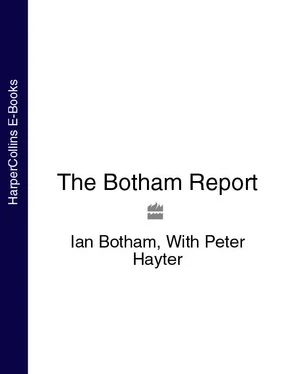The statistics do not lie. England’s ten-year record shows that we cannot compete against the best Test playing nations in the world. When we win, we win against New Zealand and India. But we’re quite capable of losing to anyone.
English cricket is in crisis, of that there is no doubt. Not only are England’s performances on the field in international and Test cricket simply not good enough, but the county clubs are living in a fool’s paradise if they believe that they can exist through county cricket alone. During 1996, of the eighteen county cricket clubs, eleven received more than half their income from the Test and County Cricket Board from Test match receipts and television revenue. In the case of Derbyshire and Glamorgan, the figure they received was seventy per cent.
The counties depend for their survival on the England team performing properly, performing well and winning. If they continue to languish near the foot of the table of international cricket rankings, then it’s not only sponsors like Tetley who will switch off.
The new England and Wales Cricket Board was able to broker a deal with Vodafone, to fill the gap caused by Tetley’s withdrawal, but no one inside the Board was in any doubt that it was only the presence of MacLaurin at the head of the game that encouraged Vodafone, of which he was a non-executive director, that English cricket was worth the gamble. Nor should they be under any illusions that unless things change substantially for the better, this may be the last big-money payday of its kind.
By the start of the 1998 summer season no sponsors had been announced not only for the new national league and Super Cup tournaments in 1999, but also for the experimental triangular one-day tournament with South Africa and Sri Lanka for that very season. And perhaps most damagingly no sponsor to replace Texaco, the company who had poured vast sums into one-day internationals since 1984.
If the results of England’s national team do not start to improve hugely and quickly, it is not merely the sponsors who will start to switch off.
Indeed whether or not the ECB succeeds in its bid to have Test cricket de-listed and put on the open market, when the Sky TV contract worth £60m is up for renewal, unless English cricket proves that it is serious about wanting to take the professional support seriously and take it forward with real and innovative change, I can imagine the following conversation taking place between the man chosen to replace MacLaurin after he has walked out in despair at the intransigence of the counties.
***
ECB man to Sky negotiator: ‘Would you mind awfully if we had that £60 million again, please?’
Sky negotiator to ECB man: ‘Sixty million for that? You must be joking. Come back when you’ve got something to sell.’
And then the game will be bankrupt.
I intend to trace how England’s fortunes have dipped over the past ten years since that excellent victory under Mike Gatting’s captaincy was achieved in 1986–87. I will highlight the mistakes, the arrogance, and the misjudgements that have plagued English cricket over the past ten years. I will discuss how counties have done a great disservice to the English national game by putting their needs ahead of the requirements of the Test side at most, if not all times. I will discuss the short-sightedness of those in charge of the English game in the past ten years of hurt. And I will suggest measures which I believe can be put in place immediately so that the job of rebuilding English cricket can start in earnest.
TEN YEARS OF HURT 1987–1997
‘From the moment when England secured the Ashes back in 1987, it took ten years to persuade the men in charge of our game that change had to come. Ten years of complacency. Ten years of waste. Ten years of hurt.’
Winning the 1986–87 series against Australia down under should have created a platform from which England could seek to dominate world cricket for a decade.
Instead it might just have been the worst thing I and my colleagues could have done for the game in this country because the successes we achieved under Mike Gatting’s captaincy merely served to paper over the cracks.
The feeling created by our performances down under, that everything in the English garden was rosy, turned out to be an illusion. Complacency was allowed to set in and complacency is death.
Australia reacted to their defeat by setting out long-term, clearly-defined goals to revive their fortunes at international level. They had lost to the Poms just once too often for comfort, realised a plan needed to be devised and stuck to it. Their rise to the status of unofficial world champions demonstrates just how well they put their strategy into practice.
We, on the other, hand proceeded as usual merely to look from one Test match and one Test series to the next.
Indeed, it was not until Mike Atherton was appointed captain to succeed Graham Gooch in 1993 that any kind of long-term selection strategy came into play. Atherton was appointed with a mandate for change, carte blanche to pick young players for the 1993–94 tour to West Indies and let them develop individually and as a team, no matter what short-term setbacks they might suffer. How long did the plan last? Three Test matches. In came Raymond Illingworth as Chairman of Selectors and, over the next two seasons, back came Graham Gooch, Mike Gatting and John Emburey as players. There’s long-term strategy for you.
From the moment England secured the Ashes back in 1987, it took ten years to persuade the men in charge of our game that change had to come. Ten years of complacency. Ten years of waste. Ten years of hurt.
When I review the performances of the England team during the decade in question one thing is immediately obvious, namely the apparently huge difference in the level of the talent available to England as opposed to that emerging elsewhere.
To the naked eye, the difference in quality is startling. While a steady stream of competent batsmen and the occasional high-class act like Mike Atherton have emerged, England have failed to produce one consistent world-class Test bowler, pace, swing, seam or spin, for a decade. When you look around world cricket the difference between the top cricketing nations and England in this respect tells it own story.
Just ponder this list of world-class Test match winners operating during the period in question – Shane Warne, Merv Hughes, Terry Alderman, Wasim Akram, Waqar Younis, Mushtaq Ahmed, Curtly Ambrose, Courtney Walsh, Allan Donald and Anil Kumble – and compare them with the best England have had to offer.
But great players are made as well as born. It is clear that, for too long, England players have reached Test level in spite of our domestic system rather than because of it. Thank goodness Lord MacLaurin understands that success is not merely cyclical and that change is absolutely fundamental for the future well-being of cricket in this country. In Raising the Standard , his plan to take English cricket back to the world summit, all those measures he is seeking to implement below first-class level demonstrate his clear sightedness and vision and, given a late change of mood among the most reactionary clubs, at the time of writing the possibility existed that he might even be given a mandate for real change.
But my reflections on England’s struggles in the period 1987–1997 also concern the mistakes, the short-sightedness, the selfishness and the plain incompetence of those individuals who, despite all the constraints placed on them by the shortcomings of the county game, could and should have made a difference.
ONE
FROM HEROES TO ZEROES
‘It was all a total fiasco. From Ashes winners eighteen months earlier England ended the summer of 1988 as the laughing stock of world cricket.’
Читать дальше












